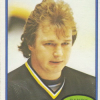Randy Carlyle

Randy Carlyle
Randolph Robert Carlyleis a Canadian former professional ice hockey player. He is currently the head coach of the National Hockey League's Anaheim Ducks and formerly the head coach of the Toronto Maple Leafs. He was raised in Azilda, just northwest of Sudbury, Ontario. He won the Stanley Cup in 2007 with the Ducks during his first stint with the team. As a player, Carlyle dressed for over 1000 games between the Toronto Maple Leafs, Pittsburgh Penguins and Winnipeg Jets, winning...
ProfessionCoach
Date of Birth19 April 1956
CityGreater Sudbury, Canada
I didn't think we played very well. For whatever reason, we seemed to struggle with the puck. We didn't react. We were frustrated by our lack of offensive punch. We had some chances, but we didn't have any finish.
He was a force out there at all times. He's a dominant young player. He's the real deal.
I thought it was a masterpiece. It was a game where we were able to get things going in a positive direction after the first shift. We had a few miscues and we took a penalty right off the bat, but we were able to regroup and get enough pucks past their goaltenders.
These points are up for grabs and any team in our position has to win our share of games. If you don't you are not going to make the playoffs.
He's a stay-at-home guy, he does everything at 100 percent all the time and keeps it simple.
He has a workmanlike attitude as every member of their hockey club does. You have to credit them with their work ethic.
I don't like to individually make comments about players, when it's from a negative point. The assessment I look at is, he wasn't as sharp as he needed to be and our team wasn't as sharp as it needed to be.
It was more of a complete game for our hockey club, and a 'character builder' because of the number of bodies we have out of our lineup,
It's disturbing. Columbus played yesterday in L.A., and they had more life and jump than we did in the first, probably 25 minutes. We have to find a way to take responsibility for that.
In playoffs and critical games, specialty teams are usually the difference-maker.
Anytime you can get points in this building it's a positive. They have a great home record and are undoubtedly one of the best teams in the league.
I think he fit in with our hockey club. Tonight we weren't good enough.
For some of these players who haven't played for some 16 months, it shows that there's a commitment to preparation and that's always a positive.
By no way, shape or form was I pointing the finger at our goaltender. He made the stops, but on the rebounds, our coverage wasn't there.